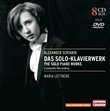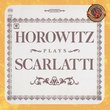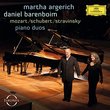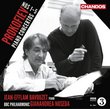| All Artists: Vladimir Horowitz Title: Horowitz Plays Scriabin Members Wishing: 1 Total Copies: 0 Label: SONY MASTERWORKS Release Date: 5/19/2015 Genre: Classical Style: Number of Discs: 3 SwapaCD Credits: 3 UPC: 888750383723 |
Search - Vladimir Horowitz :: Horowitz Plays Scriabin
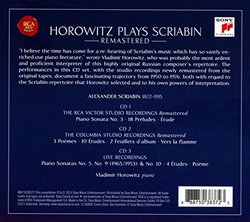 | Vladimir Horowitz Horowitz Plays Scriabin Genre: Classical
Sony Classical presents Horowitz plays Scriabin remastered, celebrating Russian composer and pianist Alexander Scriabin (1872 - 1915) and featuring the complete authorized studio recordings by Vladimir Horowitz, newly rema... more » |
Larger Image |
CD Details
Synopsis
Product Description
Sony Classical presents Horowitz plays Scriabin remastered, celebrating Russian composer and pianist Alexander Scriabin (1872 - 1915) and featuring the complete authorized studio recordings by Vladimir Horowitz, newly remastered from the original analogue tapes and discs.
"The strength of Alexander Scriabin in the period of his most active keyboard productivity was unashamed Byronic romanticism. It is one of those peculiar ironies that his strength in an earlier era may have turned out in retrospect to be his weakness in the age in which we live. Today, in a more material age, unfortunately the tendency is to regard romanticism in any form with indulgent tolerance. But the keyboard romanticism which was the hallmark of Scriabin's genius reveals remarkable durability. His lyricism and poetry derive from and were inspired by the noble tradition established much earlier by Chopin and Liszt, but Scriabin's own characteristics were and remain a masterful sense of form, logic of musical thinking in the grand manner, individual coloristic use of the keyboard, and his own harmonic inventiveness. Scriabin cannot be dismissed simply as a key figure of an outmoded musical era. The romantic age of keyboard composers culminated shortly after the middle of the nineteenth century, but Scriabin perpetuated it many years afterwards, and in the concert halls of the world its impact is still felt by millions of music lovers. My own active interest in the keyboard music of Scriabin dates back to my earliest student years. At that time great masters of the keyboard, among them Rachmaninoff and Hofmann, were performing the piano literature of Scriabin in concerts and recitals. After Scriabin s death in 1915, Rachmaninoff devoted himself to a series of all-Scriabin recitals in Russia in tribute to the composer`s memory. My esteemed colleague and friend Arthur Rubinstein gave first performances of some of Scriabin s major works in key cities of Europe. There is no doubt that there has been an interlude in public performances of his music. But I believe the time has come for a re-hearing of Scriabin s music which has so vastly enriched our piano literature." - Vladimir Horowitz
"The strength of Alexander Scriabin in the period of his most active keyboard productivity was unashamed Byronic romanticism. It is one of those peculiar ironies that his strength in an earlier era may have turned out in retrospect to be his weakness in the age in which we live. Today, in a more material age, unfortunately the tendency is to regard romanticism in any form with indulgent tolerance. But the keyboard romanticism which was the hallmark of Scriabin's genius reveals remarkable durability. His lyricism and poetry derive from and were inspired by the noble tradition established much earlier by Chopin and Liszt, but Scriabin's own characteristics were and remain a masterful sense of form, logic of musical thinking in the grand manner, individual coloristic use of the keyboard, and his own harmonic inventiveness. Scriabin cannot be dismissed simply as a key figure of an outmoded musical era. The romantic age of keyboard composers culminated shortly after the middle of the nineteenth century, but Scriabin perpetuated it many years afterwards, and in the concert halls of the world its impact is still felt by millions of music lovers. My own active interest in the keyboard music of Scriabin dates back to my earliest student years. At that time great masters of the keyboard, among them Rachmaninoff and Hofmann, were performing the piano literature of Scriabin in concerts and recitals. After Scriabin s death in 1915, Rachmaninoff devoted himself to a series of all-Scriabin recitals in Russia in tribute to the composer`s memory. My esteemed colleague and friend Arthur Rubinstein gave first performances of some of Scriabin s major works in key cities of Europe. There is no doubt that there has been an interlude in public performances of his music. But I believe the time has come for a re-hearing of Scriabin s music which has so vastly enriched our piano literature." - Vladimir Horowitz

 Track Listings (23) - Disc #1
Track Listings (23) - Disc #1